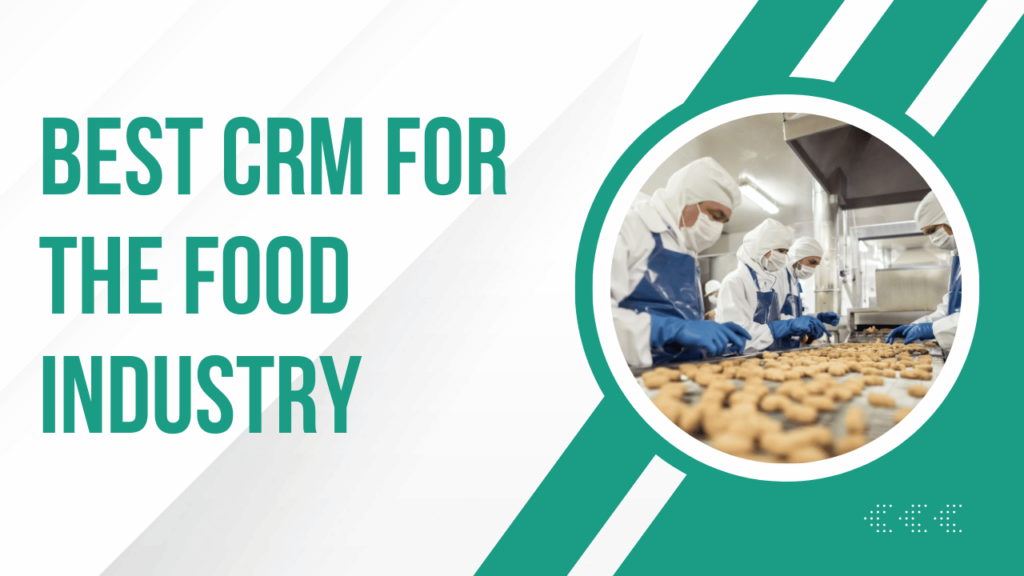Did you know that businesses using a CRM system experience a 29% increase in sales? In the fast-paced and highly competitive food industry, managing customer relationships effectively can make the difference between thriving and merely surviving. As a seasoned CRM expert, I’ve witnessed firsthand how the right CRM solution can transform operations, enhance customer satisfaction, and drive growth.
The purpose of this article is to explore and compare the top CRM solutions tailored specifically for the food industry. Whether you’re running a restaurant, a food distribution business, or a catering service, selecting the Best CRM for the food industry can streamline your operations and bolster your customer interactions.
Selecting the right CRM is pivotal for achieving business success. It not only aids in customer retention but also streamlines operations, manages data efficiently, and provides actionable insights to inform strategic decisions. In an industry where customer preferences can shift rapidly, having a robust CRM system in place ensures you stay ahead of the curve.
In this comprehensive guide, we will delve into the key features you should look for in a CRM for your business, review the top CRM solutions available in the market, and provide actionable recommendations to help you make an informed decision. We’ll cover aspects like scalability, ease of use, customization options, pricing structures, and ideal use cases for each CRM solution.
What to Look for in a CRM for Your Business
Scalability
As your food business grows, so does the complexity of managing customer relationships. A scalable CRM system ensures that as your data volume increases and your user base expands, the CRM can handle the additional load without compromising performance. Whether you’re opening new locations, expanding your delivery services, or increasing your customer base, a scalable CRM will adapt to your evolving needs.
Scalability also means that the CRM can integrate with other tools and systems you may adopt in the future. This flexibility ensures that your CRM remains a central hub for all customer-related data, facilitating seamless growth and expansion.
Ease of Use
Implementing a new CRM system can be daunting, especially for small teams or businesses new to CRM technology. An intuitive interface and a straightforward onboarding process are crucial for ensuring that your team can quickly adapt to the new system without extensive training.
Ease of use also impacts daily operations. If the CRM is user-friendly, your team can efficiently manage customer interactions, track sales, and analyze data without unnecessary complications. This leads to higher productivity and better utilization of the CRM’s features.
Customization
Every food business has unique workflows and requirements. Whether it’s managing reservations, tracking orders, or handling customer feedback, your CRM should be customizable to fit your specific needs. The ability to tailor features, dashboards, and reports ensures that the CRM aligns perfectly with your business processes.
Customization also allows you to create targeted marketing campaigns, segment your customers effectively, and deliver personalized experiences that enhance customer satisfaction and loyalty.
5 Best CRM Solutions for the Food Industry
Selecting the Best CRM for the food industry involves evaluating various options based on their features, pricing, and suitability for different types of food businesses. Here are the top 6 CRM solutions that stand out in the food industry:
1. HubSpot CRM
HubSpot is a popular CRM platform designed to cater to businesses of all sizes, offering a variety of tools for managing marketing, sales, and customer service. Known for its intuitive interface, it helps streamline customer interactions, automate marketing campaigns, and improve sales pipelines. It is particularly useful for industries that rely on customer engagement and retention, like the food industry.
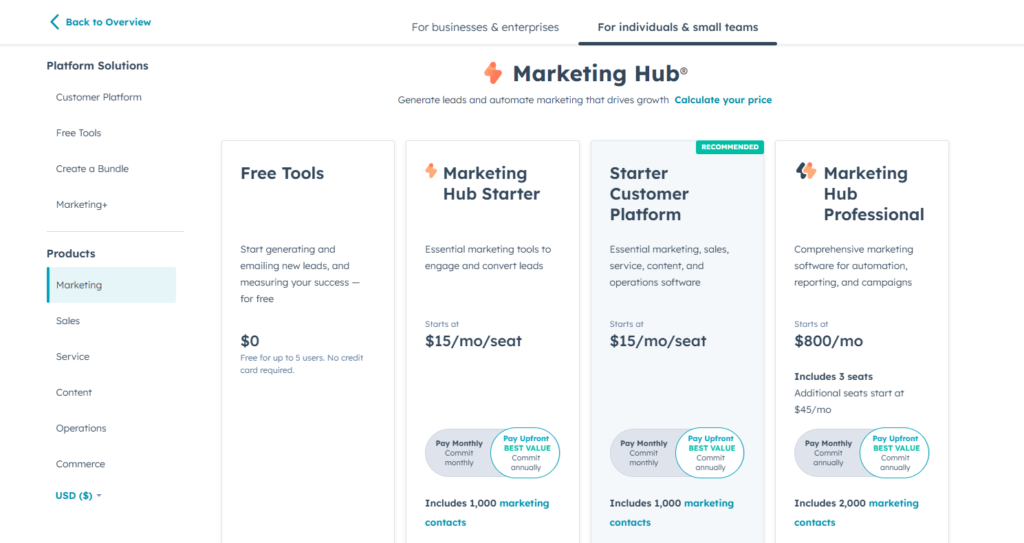
Key Features:
- Contact Management: Easily track customer data and interactions, critical for managing restaurant chains or food suppliers.
- Email Marketing Automation: Automate email campaigns for promotions, product launches, or seasonal menus.
- Sales Pipeline Management: Manage leads and sales stages, which can help food distributors track deals with retailers or restaurants.
- Live Chat and Chatbots: Engage directly with customers or suppliers via live chat, improving customer service.
- Reporting & Analytics: Measure customer data, sales performance, and marketing campaigns, enabling food businesses to optimize their operations.
- Integration with POS: Integrate with Point of Sale (POS) systems, essential for restaurants or food outlets tracking customer orders and purchases.
Pricing:
- Free Plan: $0 for core features like contact management, email marketing, and deal tracking.
- Starter: $15/month – adds more email marketing, reporting, and automation tools.
- Professional: $800/month – advanced marketing automation, CRM features, and custom reporting.
- Enterprise: $3,600/month – more robust sales and marketing tools, custom reporting, and automation for large food industry enterprises.
HubSpot is ideal for small to medium-sized food businesses like restaurants, cafes, or food delivery services looking to engage customers through marketing automation. Larger enterprises like food distributors or restaurant chains would benefit from the advanced reporting and customization tools in higher-tier plans.
2. Pipedrive CRM
Pipedrive is a sales-focused CRM designed to help businesses manage their sales pipelines effectively. It offers a user-friendly interface with customizable tools, making it ideal for sales teams looking to track leads and close deals efficiently. Its simplicity and automation features make it suitable for food industry businesses looking to improve their sales operations.
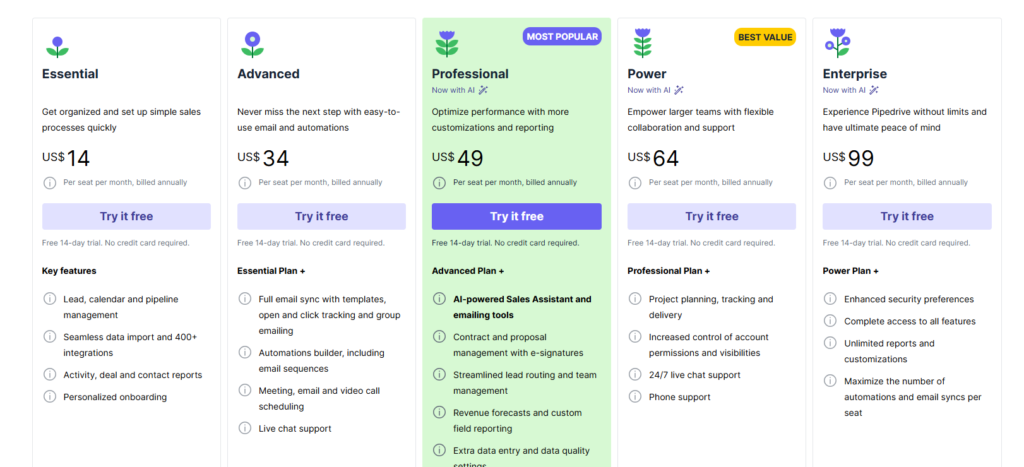
Key Features:
- Pipeline Management: Visualize and manage sales stages for food distributors, suppliers, or catering services, helping track orders and deals.
- Lead Management: Efficiently capture and track potential clients, crucial for B2B food suppliers and food wholesalers seeking new partnerships.
- Email Integration: Sync email communication to maintain clear customer interaction records, useful for maintaining vendor relationships.
- Automation of Tasks: Automate repetitive tasks like follow-ups, beneficial for food delivery businesses and catering companies managing multiple clients.
- Customizable Reporting: Generate detailed reports to track sales performance, valuable for restaurants or food suppliers assessing product popularity or sales trends.
- Mobile App: The mobile app allows sales teams or food vendors to manage operations on the go, improving efficiency for food trucks or mobile catering services.
Pricing:
- Essential Plan: $14/month per user – basic pipeline and lead management tools.
- Advanced Plan: $34/month per user – adds workflow automation, email syncing, and group emailing.
- Professional Plan: $49/month per user – more advanced automation, reporting, and team collaboration features.
- Power Plan: $64/month per user – enhanced CRM tools, customizable permissions, and team management.
- Enterprise Plan: $99/month per user – comprehensive CRM with unlimited customization, support, and security features.
Pipedrive is best suited for small to medium-sized B2B food suppliers, wholesalers, and catering companies looking to streamline their sales processes. It is especially helpful for businesses with dedicated sales teams focused on closing deals with retailers, restaurants, or large food chains.
3. Keap CRM
Keap (formerly Infusionsoft) is a CRM that combines sales and marketing automation, client management, and e-commerce tools. It is designed for small businesses looking to simplify customer management and automate workflows, making it a powerful option for the food industry to manage customer relationships, online orders, and marketing.
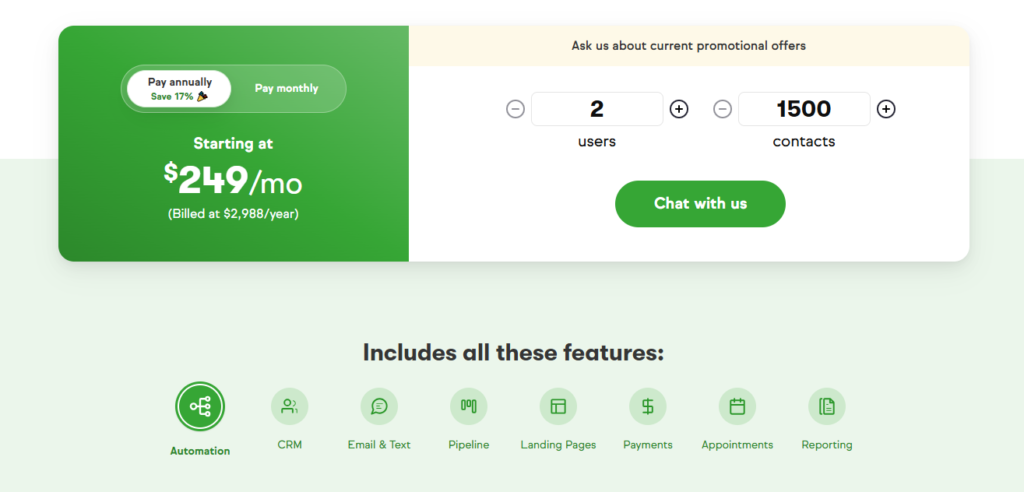
Key Features:
- Sales & Marketing Automation: Automate follow-up emails, order confirmations, or promotions, helping restaurants, cafes, or food delivery services nurture customer relationships.
- Customer Management: Centralized contact records help manage customer interactions, useful for restaurants or food catering businesses with repeat customers.
- E-commerce Integration: Seamless integration for managing online orders and payments, ideal for food businesses selling directly to consumers through websites.
- Lead Capture and Nurture: Capture leads from web forms and email marketing to turn website visitors into regular customers, benefiting meal delivery services and food subscription businesses.
- Payment Processing: Accept payments directly within the platform, useful for food vendors selling products online or managing catering orders.
- Appointment Scheduling: Automatically book and manage appointments with clients or suppliers, beneficial for catering services or B2B food vendors.
Pricing:
- Keap Pro Plan: $249/month for 1,500 contacts and 2 users – includes sales and marketing automation, client management, and e-commerce tools.
Keap is ideal for small to medium-sized food businesses such as food delivery services, catering companies, and restaurants looking to automate customer interactions, manage online sales, and streamline marketing efforts. It’s especially useful for businesses that need strong customer relationship management alongside payment processing and automation.
4. Salesforce
Salesforce is one of the most comprehensive and widely used CRMs in the world, offering robust sales, marketing, and customer service tools. It provides highly customizable solutions and integrations, making it ideal for large-scale operations in the food industry that need a tailored approach to managing customer relationships, supply chains, and sales processes.
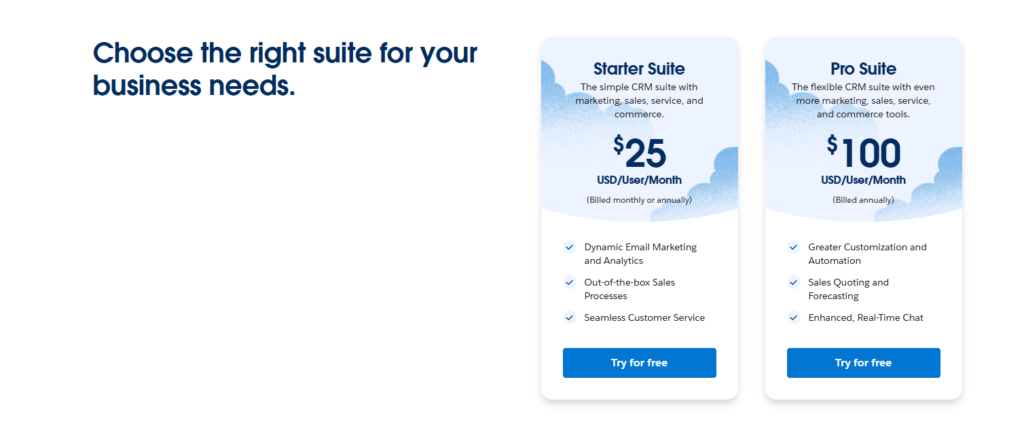
Key Features:
- Sales Cloud: Manage leads, sales opportunities, and customer interactions, beneficial for food distributors or large restaurant chains tracking deals with retailers or partners.
- Marketing Cloud: Automate personalized marketing campaigns, ideal for food delivery services, grocery stores, or restaurants looking to engage customers with targeted promotions.
- Service Cloud: Provides tools for customer support and engagement, critical for resolving customer issues in food delivery or service-oriented businesses.
- Inventory and Supply Chain Management: Integration with supply chain tools helps food manufacturers and suppliers monitor stock levels, logistics, and order fulfillment.
- Customizable Dashboards and Reports: Generate detailed, customizable reports on sales performance, customer behavior, and operational efficiency, valuable for restaurants or food chains optimizing business strategies.
- AppExchange Integrations: Connect with thousands of third-party apps, such as POS systems, delivery platforms, or payment gateways, making it suitable for large food businesses with diverse needs.
Salesforce is best suited for large food manufacturers, distributors, restaurant chains, and food logistics companies. Its highly customizable nature allows for deep integration into supply chain management, customer service, and marketing automation, making it ideal for businesses that require a tailored, scalable CRM solution.
5. Zoho CRM
Zoho CRM is a versatile and cost-effective solution that offers a wide range of tools to manage sales, marketing, and customer support. Known for its flexibility, it is well-suited for small to medium-sized businesses looking for an affordable way to automate and optimize customer interactions. Its extensive integration options make it ideal for food industry businesses managing customer relations and sales.
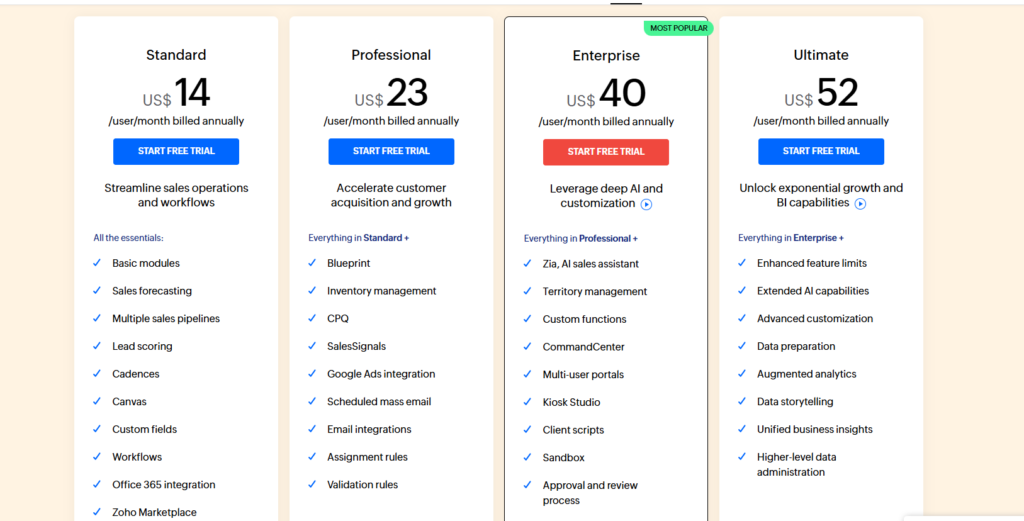
Key Features:
- Sales Pipeline Management: Helps food distributors and restaurants track deals, monitor customer orders, and manage relationships throughout the sales cycle.
- Omnichannel Communication: Manage interactions via email, social media, live chat, and phone, which is useful for food delivery services or restaurants engaging customers through multiple platforms.
- Marketing Automation: Automate email campaigns, promotions, and customer segmentation, helping food businesses launch seasonal menus or special offers.
- Inventory Management: Track inventory levels, orders, and suppliers, essential for food wholesalers and suppliers managing large stock and supply chains.
- Custom Dashboards and Reporting: Generate reports on customer trends, sales, and performance metrics, valuable for restaurants and food chains optimizing business operations.
- Integrations with Third-Party Apps: Integrates with other software like POS systems, accounting, and e-commerce platforms, making it easier for restaurants or food retailers to streamline operations.
Zoho CRM is ideal for small to medium-sized food businesses, including restaurants, food delivery services, and food suppliers, that need an affordable, flexible CRM with powerful automation and reporting tools. Its inventory management and omnichannel communication features make it well-suited for businesses that deal with both B2B and B2C operations.
Each of these CRMs offers unique features tailored to the specific needs of food businesses, ensuring that you can find the perfect match for your operations.
Which CRM is Best for Your Food Business?
After evaluating the top CRM solutions for the food industry, Toast CRM emerges as the best CRM for the food industry. It offers comprehensive features tailored specifically for restaurants and food businesses, including order management, customer feedback integration, and robust reporting tools. Its scalability and ease of use make it an ideal choice for businesses of all sizes.
Use Case Recommendations
- Restaurants and Cafes: Toast CRM and Upserve are excellent choices, offering features like table management, reservation systems, and customer feedback tools that enhance the dining experience and streamline operations.
- Food Distributors: Zoho CRM and NCR Silver provide strong inventory management and order tracking capabilities, essential for distribution businesses that need to manage large volumes of orders and maintain efficient supply chains.
- Catering Services: TouchBistro and Lightspeed offer customization options and robust reporting, which are critical for managing large events and catering to specific client needs effectively.
Next Steps
To take your customer relationship management to the next level, start by exploring the recommended CRMs. Sign up for free trials or schedule demos with Toast CRM, Upserve, or any of the other top solutions mentioned. Evaluate how each CRM fits with your specific business needs and workflows and make an informed decision to enhance your customer interactions and drive business growth.
How to Choose a CRM: A Beginner’s Buying Guide for the Food Industry
Selecting the right CRM can be overwhelming, especially if you’re new to CRM systems. Here’s a step-by-step guide to help you choose the best CRM for the food industry:
Identify Your Business Needs
Begin by assessing what you need from a CRM. Do you require features like order tracking, customer feedback management, inventory integration, or reservation systems? Understanding your specific requirements will narrow down your options and ensure you select a CRM that addresses your unique challenges.
Evaluate Features
Look for CRMs that offer the features you need. Compare different solutions to see which ones provide the best fit for your business processes. Pay attention to key functionalities like automation, reporting, integration capabilities, and mobile access. For instance, if your business relies heavily on online orders, ensure the CRM can seamlessly integrate with your e-commerce platform.
Consider Your Budget
CRMs come in various pricing tiers. Determine your budget and find a CRM that offers the best value within your financial constraints. Consider not just the initial cost but also any additional fees for add-ons or higher-tier features. It’s essential to balance cost with the features you need to ensure you’re getting the best return on investment.
Assess Ease of Use
Ensure that the CRM is user-friendly and easy to navigate. A steep learning curve can hinder adoption and reduce the effectiveness of the system. Look for CRMs that offer intuitive interfaces and comprehensive onboarding support. User-friendly CRMs ensure that your team can quickly adapt and fully utilize the system’s capabilities.
Check Customization Options
Your CRM should be flexible enough to adapt to your unique workflows. Check if the CRM allows customization of dashboards, reports, and workflows to match your business needs. Customizable CRMs enable you to tailor the system to fit your operations, enhancing efficiency and effectiveness.
Evaluate Customer Support
Reliable customer support is crucial for resolving any issues that arise. Choose a CRM provider that offers robust support options, including live chat, email support, and extensive knowledge bases. Good customer support ensures that you can get assistance whenever you need it, minimizing downtime and disruptions.
Read Reviews and Testimonials
Research what other food businesses are saying about the CRM solutions you’re considering. Reviews and testimonials can provide insights into the CRM’s performance, reliability, and customer satisfaction. Learning from the experiences of others can help you make a more informed decision.
Take Advantage of Free Trials
Most CRM providers offer free trials or demos. Use these opportunities to test the CRM and see how well it fits with your business operations before making a commitment. Free trials allow you to explore the CRM’s features and ensure it meets your expectations without any financial risk.
Finalize Your Choice
After evaluating all factors, select the CRM that best aligns with your business needs, budget, and growth plans. Ensure that it offers the scalability and features necessary to support your business in the long term. Making a well-informed decision will set the foundation for effective customer relationship management and business growth.
Conclusion
In today’s competitive food industry, selecting the Best CRM for the food industry is essential for managing customer relationships, streamlining operations, and driving business growth. By considering factors like scalability, ease of use, and customization, you can choose a CRM that not only meets your current needs but also adapts as your business evolves.
When selecting a CRM, always keep your long-term business goals in mind. A scalable and customizable CRM will support your growth and help you maintain strong customer relationships over time. Don’t hesitate to explore the top CRM solutions recommended in this guide and take advantage of free trials or demos to find the perfect fit for your food business.
Ready to enhance your customer relationship management? Explore and compare the CRMs mentioned above to find the best solution for your business today.
FAQs
Do I really need a CRM?
Yes, a CRM system helps you manage customer interactions, track sales, and streamline operations, leading to improved customer satisfaction and increased sales. In the food industry, where customer preferences can change rapidly, a CRM ensures you stay connected and responsive to your customers’ needs.
How secure is my data in a CRM?
Most reputable CRM providers implement robust security measures, including data encryption, secure access controls, and regular security audits to protect your data. It’s essential to choose a CRM that prioritizes data security to safeguard your business and customer information.
Can a CRM integrate with my existing tools?
Many CRMs offer integration with popular tools and platforms, such as email marketing services, accounting software, and point-of-sale systems, ensuring seamless workflows. Before selecting a CRM, verify that it can integrate with your existing tools to enhance efficiency and avoid disruptions.
What is the cost of implementing a CRM system?
CRM costs vary depending on the provider and the features you need. Pricing models can include monthly subscriptions, one-time fees, or tiered pricing based on the number of users and features. It’s important to consider your budget and choose a CRM that offers the best value for your investment.
How long does it take to set up a CRM?
The setup time depends on the complexity of the CRM and your business requirements. Simple CRMs can be set up in a few hours, while more complex systems may take several weeks. Proper planning and support from the CRM provider can help streamline the setup process.
What are the key benefits of using a CRM in the food industry?
A CRM can help you better understand your customers, personalize their experiences, manage reservations and orders efficiently, track sales and performance, and implement effective marketing strategies. These benefits lead to increased customer satisfaction and business growth.
Can a CRM help with marketing automation?
Yes, many CRMs offer marketing automation features that allow you to create targeted campaigns, segment your audience, and track the effectiveness of your marketing efforts. This automation helps you engage with your customers more effectively and efficiently.
Is training required to use a CRM?
While many CRMs are designed to be user-friendly, some training may be necessary to fully utilize all features. Most CRM providers offer onboarding support, tutorials, and customer service to help you and your team get up to speed quickly.
How does a CRM improve customer retention?
A CRM helps you track customer interactions, preferences, and feedback, allowing you to personalize your services and address any issues promptly. By maintaining strong relationships and understanding your customers’ needs, a CRM enhances customer loyalty and retention.
Can a CRM help with inventory management?
Some CRMs, like Zoho CRM and Lightspeed, offer integration with inventory management systems, allowing you to track stock levels, manage orders, and ensure that you can meet customer demand efficiently. This integration helps prevent stockouts and overstocking, optimizing your inventory management.
By following this guide, you’ll be well-equipped to select the Best CRM for the food industry that aligns with your business needs and supports your growth objectives. Investing in the right CRM is a strategic move that can transform your customer relationships and drive your business toward sustained success.
I’m Rejaul Karim, an SEO and CRM expert with a passion for helping small businesses grow online. I specialize in boosting search engine rankings and streamlining customer relationship management to make your business run smoothly. Whether it's improving your online visibility or finding better ways to connect with your clients, I'm here to provide simple, effective solutions tailored to your needs. Let's take your business to the next level!

